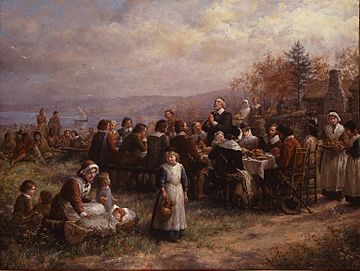Days of humiliation and thanksgiving facts for kids
In the past, especially among Protestant Christians, people would set aside special days for public worship and reflection. A day of humiliation was a day for fasting and prayer. People would observe it when they believed something bad had happened because of God's judgement. This could be a disaster or a difficult time.
On the other hand, a day of thanksgiving was a day for giving thanks. It was celebrated when people believed God had shown them kindness and favor. These special days could be announced by the government or the church.
Contents
History of Special Days
Special days of prayer for specific reasons were first ordered in England a very long time ago. One of the earliest was in 1009 by King Æthelred the Unready.
Later, in the mid-1500s, during the time of Queen Elizabeth I, days of fasting were held in England. These were often in response to serious events like outbreaks of the plague or the threat from the Spanish Armada in 1588.
The Puritans, a group of strict Protestants, especially liked these special days of fasting and prayer. By the mid-1600s, days of thanksgiving were celebrated every year in New England (part of what is now the United States) during November.
Days of Humiliation and Fasting
A day of humiliation and fasting was announced when people faced a big problem. This could be a drought, a flood, a fire, a military defeat, or a widespread illness like the plague. Sometimes, these days were also held before starting a very difficult task.
During these days, people were expected to think deeply about their own actions. They would look for any sins they might have committed and ask for forgiveness. The idea was to calm what they believed was God's anger. Everyone between the ages of 16 and 60 was expected to spend the whole day fasting. They would go to church, listen to long sermons, and quietly think about their sins.
Days of Thanksgiving
A day of thanksgiving was held when people saw signs of God's kindness. This could be something good like rain that helped crops grow for a good harvest. It could also be the arrival of important supplies or recovering from a serious sickness. Sometimes, these days were celebrated after a long time of general success without any major disasters.
On days of thanksgiving, people would also spend the day in church. However, instead of asking for forgiveness, they would pray with thanks. They would sing songs of praise and enjoy a special meal. Puritan feast days were more serious than typical celebrations. While they were joyful and thankful for recent blessings, Puritans also saw them as a time to look forward to the future, especially to the idea of the Kingdom of God.
Why These Days Replaced Other Holidays
The Puritans did not celebrate many of the traditional Christian holidays. They did not observe Easter or Christmas, or days honoring saints. Instead, they created their own special days in response to current events.
However, some natural cycles still held meaning for them. For example, the season of Spring continued to be linked with ideas of new beginnings and spiritual renewal, much like Easter had been. Days of thanksgiving were usually celebrated in the Autumn after the harvest was gathered.
Images for kids



